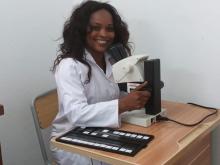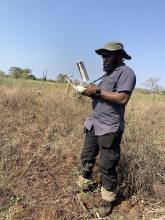
Lailah Gifty Akita holds a PhD in Natural Science with a specialisation in paleoecology from Friedrich Schiller University and International Max Planck Research School for Biogeochemical Cycles, Jena, Germany.
She is a Lecturer at the Department of Marine and Fisheries Sciences, University of Ghana. Dr. Akita’s research interests include Benthic ecology, pollution ecology, and paleo-ecology. She seeks to understand aquatic ecosystem changes using multiple indicators, including biological, biochemical, and microfossil approaches.
Her current research focuses on "Microfossil Approach for the Study of Environmental changes in Tropical Estuaries and Lagoons (MASETEL)", which she has won a travel grant from Past Global Changes (PAGES), Inter-Africa Mobility Research Fellowship for African early-career scientists studying past global changes.
The PAGES fellowship will support Dr. Akita’s travel to the Université Félix Houphouët- Boigny de Cocody (UFR, STRM), Côte d'Ivoire. The host supervisor is Professor Soro Nagnin (The UFR STRM, director). She will be working in collaboration with Dr. Yao N'goran Jean-Paul, who is paleo-scientist (UFR STRM) from Côte d'Ivoire.
